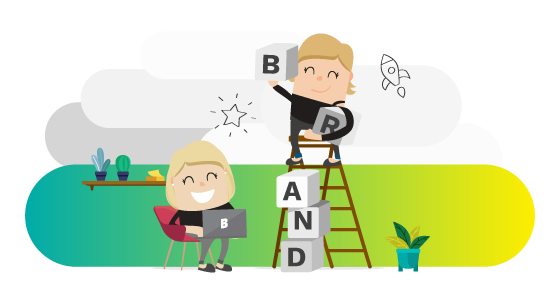HR marketing and employer brand: what’s the difference?
Mar 28 2023 / 3 min

In a job market where talents have many opportunities, your company has everything to gain by standing out. To achieve this, leveraging the strengths of your employer brand and HR marketing to develop effective tactics and strategies is a safe bet.
Easier said than done? Start by refreshing your memory to guide your recruitment efforts better and strengthen your positioning as an employer.
Quick definitions (and examples)
In the complex world of talent acquisition and retention, two terms often take center stage: HR marketing and employer brand. While both aim to make a company more attractive to potential employees, they have distinct roles and applications. But what sets them apart, and how do they overlap? Let’s look at the definitions of HR marketing and employer brand to uncover their unique characteristics.
HR marketing: Often compared to traditional marketing, HR marketing revolves around strategies and practices designed to attract, recruit, and retain top talent. Instead of products or services, the focus here is on selling the company as the best place to work. HR marketing relies on a set of communication tools, platforms, and campaigns to favourably position an organization in the eyes of potential and current employees.
Example 1: A company launches a targeted social media campaign to generate applications for an upcoming job fair.
Example 2: An organization creates engaging content, such as employee testimonials and behind-the-scenes videos, to showcase its dynamic culture to potential candidates.
Employer brand: This refers to the organization’s reputation as an employer and the value it offers its employees. It’s the company’s “employee value proposition.” Employer branding highlights the company’s culture, values, and work environment to differentiate itself in the job market and attract the right talent. An effective employer brand can reduce recruitment costs, shorten time-to-hire, and increase employee engagement and retention.
Example 1: A tech company creates an online portal showcasing its innovative projects, team-building activities, and employee achievements to cement its reputation as both an industry leader and a great place to work.
Example 2: a retail brand collaborates with employees to share their personal and career development experiences on the company website, highlighting the brand’s commitment to professional growth.
Employer brand and HR marketing: two sides of the same coin?
These two aspects are far from interchangeable. On the contrary, they work hand in hand to ensure your company shines in the eyes of your target candidates – and from an angle that speaks to them!
Their common ground: both employer brand and HR marketing are about your company’s identity as an employer. The first element relates to your brand pillars and positioning in the job market, while the second concerns the marketing strategies and tactics used to “sell” those advantages to your qualified prospects.
The 3 main differences between employer brand and HR marketing
1. Employer identity vs. promotion
On the one hand, the employer brand establishes the benefits of joining your team. A clear and consistent definition is crucial. On the other hand, HR marketing helps put your employer brand on the map and deliver key messages to qualified prospects, at the right place and at the right time.
Depending on your talent targets, employee value propositions (EVPs) summarize these distinctive aspects and strengthen your employer brand. For example: Do you stand out for professional development opportunities or for flexibility in work-life balance? These EVPs can then be leveraged in various HR marketing tactics.
Your employer brand defines and crystallizes your employer positioning, while your HR marketing showcases it and helps you stand out.
In other words, when candidates weigh their options on where to apply, the image that comes to mind when they see your logo or hear about your company corresponds to your employer brand.
2. Starting point vs. game plan
Since one supports the other, there should be no HR marketing without a clearly defined employer brand: your recruitment effectiveness is tied to your reputation as an employer.
Think of HR marketing as the game plan – and its execution. For example, you might decide on the best ways to showcase your employer brand: combining employer brand–focused content based on the candidate journey with a consistent presence on social media. You might add compelling job postings and distribute them through an employer brand ambassador network or a referral program. It all depends on your needs!
3. Consistency vs. evolution
Because the employer brand is based on lasting elements like the company’s mission, vision, and values, consistency is one of its fundamental principles. By being consistent, your employer brand messages and arguments are easier to recognize and inspire greater trust.
That’s why it should remain relatively stable, while HR marketing can evolve over the course of your recruitment campaigns and according to industry and labour market trends.
What’s the point of having a strong employer brand and solid HR tactics? To make it shine!
In short, HR marketing and employer brand are not interchangeable: they are deeply interconnected and contribute to the success of your recruitment efforts and the health of your company culture. After all, building a strong employer brand can help you receive twice as many resumes and prevent your prospects from dropping out of the application process.
Now that their roles are clearer, it will be easier to take action. What are the next steps in your employer brand strategy? Let’s talk about it!
You may also like

What If Brand Were Your Best B2B Marketing Investment?
In B2B marketing, the word brand rarely sparks overwhelming enthusiasm. It’s often associated with a logo, a taglin[...]
Branding
Jan 26, 2026
/4 min

State of B2B Marketing in Quebec in 2026: What Our Exclusive Study Reveals
Executive Summary – Bang Marketing Study 2026 Territory studied: Quebec Sample: 211 B2B companies Period: September[...]
Strategy
Jan 12, 2026
/8 min

AI Is Making Us Ramble… Here’s How to Break the Habit
There’s a new plague in B2B marketing. It’s not AI stealing our jobs. It’s AI making us ramble. Sales pitches read [...]
Content marketing
Dec 15, 2025
/3 min
